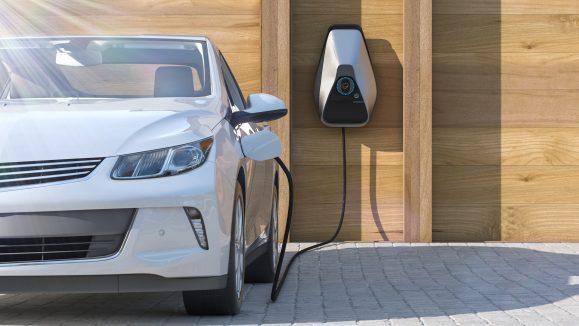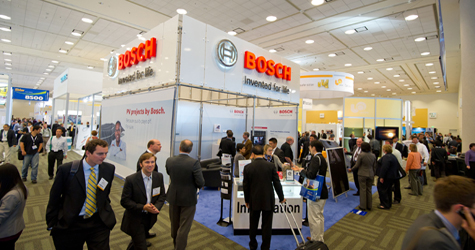In the past two decades, the car market has declined twice: first due to the 2008 economic crisis, and then due to falling sales in China. Most recently, the lockdowns implemented to combat the coronavirus pandemic, causing auto-production plants to close globally and a loss of consumer spending will lead to an unprecedented 23% decline in 2020 (IDTechEx prediction).
In the following decade (2030 – 2040), things will not improve: the global car market will be blindsided by the rise of autonomous vehicles, which greatly reduces the need for private car ownership. Within this scenario, it is electric cars which will remain a beacon of growth, satisfying both the governmental drive to clean air in cities whilst also working more readily with autonomous vehicle technology.
Source: IDTechEx with historic data from industry associations. For more information, please see the IDTechEx report, “Advanced Electric Cars 2020-2040”.
In their simplest form, an electric car consists of an energy storage device powering one electric traction motor, which spins wheels via a transmission. First invented in the 19th century, electric cars ultimately lost the battle to the internal combustion engine, unable to compete with the energy density of gasoline. Over one hundred years later, the Li-ion battery is enabling their meteoric rise as a solution for reducing local emissions and green-house gases.
Once derided as toys, today electric cars with barely 15 years of development offer cutting-edge automotive technology and performance, from sub 2.5 second 0 – 60mph acceleration, to autonomous driving functionality and solar bodywork. Battery-electric vehicles (BEV) are the endgame: zero emissions at point of use and the focus of automotive start-ups (and China). On the other hand, Plug-in Hybrid Electric Vehicles (PHEV) provide a short/mid-term solution, soothing initial fears of range anxiety.
The brand new IDTechEx report, “Advanced Electric Cars 2020-2040”, provides a long-term outlook for the car market and enabling technologies in the wake of COVID-19. The key sections are summarized.
Forecasts and COVID-19 Impact
In the report, IDTechEx provide long-term forecasts to 2040 for electric passenger cars by region (China, US, UK, France, Germany, Norway, Netherlands, Denmark, RoW) and by powertrain (battery-electric, plug-in hybrid, fuel-cell). Forecasts are presented in number of vehicles, battery demand (GWh) and market size ($ billion), with historic data back to 2015.
All forecasts are adjusted to reflect the impact of the global COVID-19 pandemic: amid economic uncertainty and unemployment, the auto industry has been one of the hardest hit as car purchases, typically the second largest consumer purchase (the first is a house), are now more difficult to justify for millions of consumers worldwide.
Li-ion Batteries
The IDTechEx report identifies and explains trends in Li-ion batteries for electric cars. For example, nickel content is increasing while cobalt content is decreasing: why is this important for automakers and the overall sustainability of the industry? It also provides historic market data on the Li-ion technology mix based on our database of electric cars in top auto markets: China has phased-out LFP from over half its car market to less than 2% today; why will Tesla contradict this and adopt LFP for Model 3 sales in China?
Electric Traction Motors
All electric motors have the same purpose of converting electrical energy to mechanical energy, but there are many types of motors that derive their names from their construction, principles of operation, or even from the control technique employed on them. The IDTechEx report explores why automakers are converging on permanent magnet motors, multiple motors, provide a benchmarking analysis of the different motor types, and finally, an outlook for how IDTechEx expects the motor market to evolve over the next ten years.
IDTechEx predicts that the rise of autonomous vehicles will have a profound impact on the global car market as it enables mobility-as-a-service to become cheaper than private-car ownership. The report shows forecasts of autonomous passenger car miles, revealing how this will lead to a fundamental peak-car scenario. IDTechEx appraises the key underlying technologies such as LiDAR and camera-based systems: is the camera-only approach a high-risk gamble or a winning strategy that will be copied?
For more information on this report, please visit www.IDTechEx.com/Cars or for the full portfolio of Electric Vehicles research available from IDTechEx please visit www.IDTechEx.com/Research/EV.
IDTechEx guides your strategic business decisions through its Research, Consultancy and Event products, helping you profit from emerging technologies. For more information on IDTechEx Research and Consultancy, contact research@IDTechEx.com or visit www.IDTechEx.com.










1 Comment
Freyr Energy was founded on the principles of making solar energy affordable and accessible for everyone. In order to make adoption of solar energy a reality at the grass-root level, we have identified that consumer awareness, affordability and accessibility play an integral role. With our innovative platform, SunPro+, our extensive channel-partner network and our efficient service we ensure that these three factors are addressed to make sure your venture into solar energy is hassle-free. Visit https://freyrenergy.com/